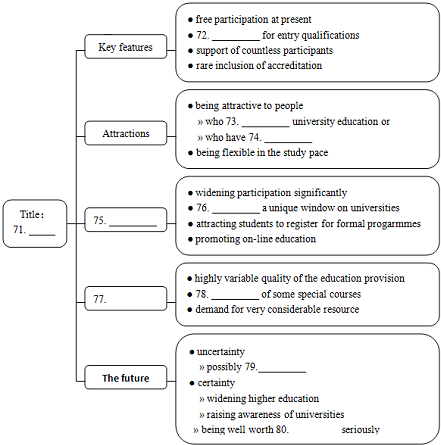题目内容
7.Daniel Anderson,a famous psychologist,believes it's important to distinguish television's influences on children from those of the family.We tend to blame TV,he says,for problems it doesn't really cause,overlooking our own roles in shaping children's minds.One traditional belief about television is that it reduces a child's ability to think and to understand the world.While watching TV,children do not merely absorb words and images (影像).Instead,they learn both explicit and hidden meanings from what they see.Actually,children learn early the psychology of characters in TV shows.Furthermore,as many teachers agree,children understand far more when parents watch TV with them,explaining new words and ideas.Yet,most parents use an educational program as a chance to park their kids in front of the set and do something in another room.
Another argument against television is that it replaces reading as a form of entertainment.But according to Anderson,the amount of time spent watching television is not related to reading ability.TV doesn't take the place of reading for most children; it takes the place of similar sorts of recreation,such as listening to the radio and playing sports.Things like parents'educational background have a stronger influence on a child's reading."A child's reading ability is best predicted by how much a parent reads."Anderson says.
Traditional wisdom also has it that heavy television-watching lowers IQ (智商) scores and affects school performance.But here,too,Anderson notes that no studies have proved it.In fact,research suggests that it's the other way around."If you're smart young,you'll watch less TV when you're older,"Anderson says.Yet,people of lower IQ tend to be lifelong television viewers.
For years researchers have attempted to show that television is dangerous to children.However,by showing that television promotes none of the dangerous effects as conventionally believed,Anderson suggests that television cannot be condemned without considering other influences.
36.By watching TV,children learnB.
A.images through words
B.more than explicit meanings
C.more about images than words
D.little about people's psychology
37.An educational program is best watched by a childC.
A.on his own
B.with other kids
C.with his parents
D.with his teachers
38.Which of the following is most related to children's reading ability?D
A.Radio-listening
B.Television-watching
C.Parents'reading list
D.Parents'educational background
39.Anderson believed thatC.
A.the more a child watches TV,the smarter he is
B.the younger a child is,the more he watches TV
C.the smarter a child is,the less likely he gets addicted to TV
D.the less a child watches TV,the better he performs at school
40.What is the main purpose of the passage?D
A.To advise on the educational use of TV.
B.To describe TV's harmful effects on children.
C.To explain traditional views on TV influences.
D.To present Anderson's unconventional ideas.
分析 本文叙述著名心理学家Daniel Anderson对孩子们看电视的看法,打破了以往人们认为看电视对孩子不好的想法.他认为孩子们看电视不知学到显现出来的东西;父母陪孩子看电视,孩子可以学到更多知识;孩子看电视并没有代替孩子阅读,并没有影响孩子的智商.
解答 36.答案:B.细节理解题.根据第二段的Instead,they learn both explicit and hidden meanings from what they see.可知孩子们通过看电视,可以学到显性和隐藏的意义,因此不仅仅学到隐藏的意思.
37.答案:C.推理判断题.根据第二段的Furthermore,as many teachers agree,children understand far more when parents watch TV with them"孩子们有父母陪着看电视理解的更多",故推断教育节目最好是父母陪着孩子看.
38.答案:D.细节理解题.根据第三段的Things like parents'educational background have a stronger influence on a child's reading.可知父母的教育背景对孩子的阅读有很强的影响.
39.答案:C.细节理解题.根据第四段的"If you're smart young,you'll watch less TV when you're older"可知如果你小时越聪明,长大看电视看得越来越少.
40.答案:D.推理判断题.根据最后一段的Anderson suggests that television cannot condemned without considering other influences."Anderson认为不应该按照常规,不考虑电视的其他影响而去谴责电视"故推断这篇文章的目的是呈现Anderson打破常规的想法.
点评 教育类短文阅读侧重考查学生的细节理解能力.问题设置巧妙,根据题干要求,学生自己阅读,就能在文中找到答案.充分考查学生的语篇理解能力.

-Sure.____( )
| A. | Why not? | B. | What's up? | C. | So what? | D. | What for? |
---___________.You know,it has won five Oscar awards.( )
| A. | That‘s how I see it | B. | It‘s all right | ||
| C. | I hope it goes well for you | D. | You can do it. |
Why do we talk so much about the weather?When we meet new people,we don't begin by telling them our life story.We start with small talk,a polite conversation about something like traffic or weather.
Research suggests that small talk can build new friendships.When we begin conversations with new people,we want to feel comfortable,and so do they.We use small talk to find common interests.Once we have a common interest,a friendship can begin.
Small talk even helps people get hired.In order to impress at a job interview,you need to bond with the interviewer right away.Proper small talk can make that first impression get you the job.
So,how can you make small talk lead to a new friendship or job?First off,find common ground.Select something around you that you share with the other person.
Next,keep the conversation going.Compliment (赞美) the other person to make himor her feel comfortable,and ask questions to show interest.
Third,keep eye contact (接触).When you look people in the eye,they feel you appreciate what they are saying.It makes you appear honest and builds trust.
Naturally,shy people might not have enough confidence to start up conversations with strangers.Talking to someone you don't know is not the easiest thing to do!Some experts say with more practice,small talk does get easier.
Some people avoid small talk because they dislike discussing things like traffic or weather.For them,they are just too small.However,when you think about it,small talk is anything but small.In fact,it is actually a very big deal!
| Title | Small Talk:A Big (76)Deal |
| Introduction | We are likely to make small talk when we (77)first meet people. |
| (78)Advantages/Benefits | ?Small talk can help people form (79)New friendships. |
| ?Small talk can also help people get a (80)job/position/post. | |
| Advice | ?Find some topics (81)shared with the other person. |
| ?Keep the talk going by making compliments and (82)asking/rasing questions. ?Keep eye contact in conversation to build (83)trust. | |
| ?(84)Practice/Practise more in order to make small talk easier. | |
| Conclusion | Small talk really (85)matters/means a lot to us. |
| A. | rose to | B. | arose from | C. | rose from | D. | raised to |

